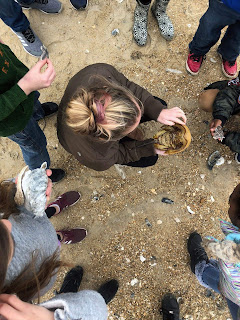Secretary Michael Regan recently received hands-on experience beekeeping when he visited an environmental educator in Haywood County.
During a trip to Western North Carolina, Regan stopped at the Mountain Research Station to present Bethany Sheffer with her certification for completing the department’s environmental education program.

“We congratulate Bethany for completing her certification. Visiting the hives and learning about her work to provide essential services to young people in western North Carolina was an amazing experience. I can only imagine how wonderful it would be to see it from a child’s perspective.” said the secretary.
Bethany is the outreach specialist for HIGHTS, an organization which services vulnerable young people in the area. HIGHTS has four beehive sites in three counties including the site at the Mountain Research Station. Bethany is responsible for managing the 20 hives with the help of the Jackson, Haywood and Macon County beekeeping associations through their beekeeping mentorship programs.
Prior to working with HIGHTS, Bethany worked for Southern Appalachian Raptor Research (SARR), an organization dedicated to the conservation and protection of birds in the Southern Appalachians. There she educated students and groups about migratory birds and conservation.
Bethany has also served as a Conservation Trust for North Carolina AmeriCorps member at Balsam Mountain Trust in Sylva. She is an at-large board member for the Elisha Mitchell Audubon Society in Asheville and an outreach and education volunteer for Phoenix Landing Parrot Rescue.
A native to the forested lands of Michigan’s Upper Peninsula, Bethany grew up exploring nearby creeks and catching crayfish in the small town of Rapid River. Bethany credits these experiences, and her father’s enthusiasm for the outdoors with instilling a lifelong appreciation of the natural world.
For her community partnership project, as part of her certification, Bethany created, organized and led a community festival that focused on migratory birds and bird conservation through an existing global initiative called World Migratory Bird Day.
With the support of her AmeriCorps host site, Balsam Mountain Trust, she was able to offer an environmentally-themed community event free of charge to residents of the surrounding counties Jackson and Haywood. The effort engaged residents and bolstered regional partnerships. In its second year, the event attracted more than 250 participants.
Bethany says her certification changed the way she approached environmental issues. “Completing the certification program really helped me to understand how to communicate to people of varying ages and backgrounds about environmental issues; not to necessarily be a full-blown advocate for environmental policies during programs, but to instead give participants the scientific facts along with meaningful outdoor experiences to help them make connections.”
Bethany relished the professional relationships and friendships she formed during the workshops. “I could not have hoped for more insightful workshops, skill-building opportunities, or interdisciplinary collaboration through this program. Not only did I glean practical skills and knowledge but the confidence I found in myself now allows me to mentor others in the field.”
 “Most kids probably think that drones are just cool toys, but this program will teach them the various ways that drones can be used in the environmental research and conservation fields, which will help inspire potential future careers in these young bright students,” said Meredith. “The northeastern North Carolina community that I will be reaching is very rural and is typically underrepresented when it comes to educational opportunities such as this. Upon completion of this project, this drone exploration program will be added to the list of programs offered through Jennette’s Pier.”
“Most kids probably think that drones are just cool toys, but this program will teach them the various ways that drones can be used in the environmental research and conservation fields, which will help inspire potential future careers in these young bright students,” said Meredith. “The northeastern North Carolina community that I will be reaching is very rural and is typically underrepresented when it comes to educational opportunities such as this. Upon completion of this project, this drone exploration program will be added to the list of programs offered through Jennette’s Pier.”










































